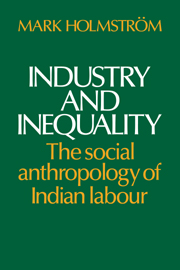4 - Factories and workshops
Published online by Cambridge University Press: 05 February 2012
Summary
My subject is the different kinds of industrial workers, and whether some are privileged at the others' expense. But workers are links in a longer chain of relations of dependence and interdependence, extending to the owners of capital, large- and small-scale entrepreneurs and, at the other end, all who depend on industrial workers for markets, remittances or help.
The last chapter was mainly about small firms and those on the margin of the ‘organized sector’: how they have grown, and the kinds of people who set them up and manage them. Here I move away from the study of individual firms to the economic and technical links between the strong and the weak, whether these people are entrepreneurs, ‘workers’ or employees, or those outside the system of formal employment relations because they are self-employed, ‘unemployed’ or family dependants.
Dependence, interdependence, independence?
Consider three kinds of dependence:
‘Raajan’, a young engineer, worked in a Bangalore electronic factory, when the firm's foreign collaborators suggested he should start his own ancillary supplying components to their factory in India. They put up 75 per cent of the capital and gave him a five-year contract to work exclusively for them. He now employs about twenty workers, mostly girls. Although he gives out work to other firms, none depends on him exclusively, as he does on the foreign firm.
- Type
- Chapter
- Information
- Industry and InequalityThe Social Anthropology of Indian Labour, pp. 110 - 180Publisher: Cambridge University PressPrint publication year: 1984

